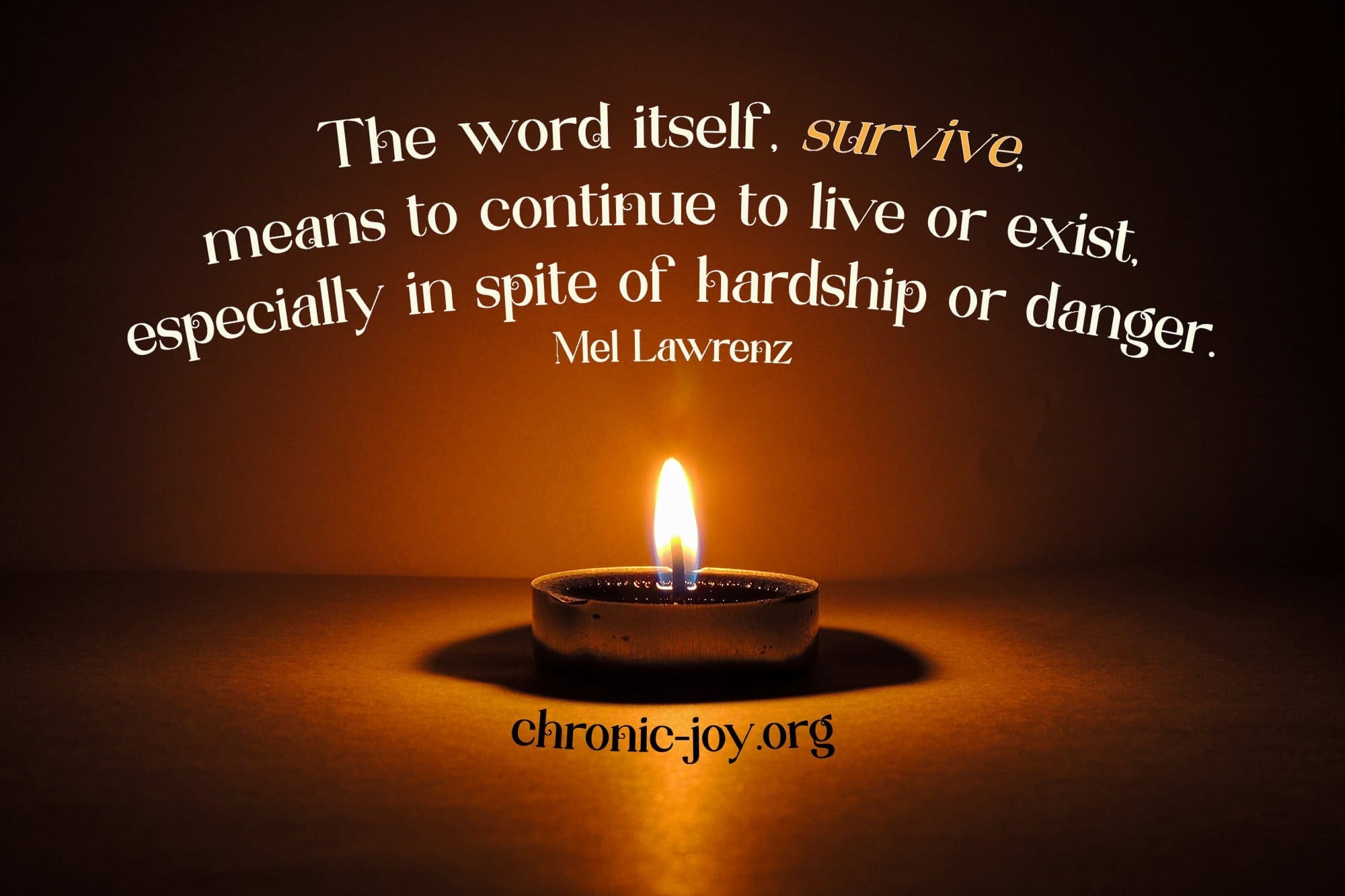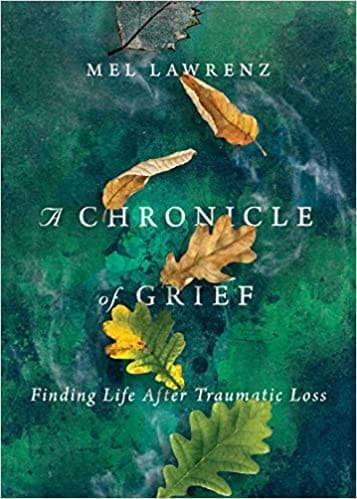
“The word itself, survive, means to continue to live or exist, especially in spite of hardship or danger.” Mel Lawrenz
TRAUMATIC LOSS
I was in an unpleasant discussion at work when my cell phone sounded that simple and unobtrusive “ding” that meant a text message had arrived. A few minutes later, I slipped the phone out of my pocket and read: Eva not breathing. Pray.
What I was looking at made no sense. I stared at the screen. My brain locked up. I felt a wave of dread wash over my body, then adrenaline. I ducked into an empty room, used my phone to call my wife, and learned that my thirty-year-old daughter was in an ambulance being whisked away to a hospital, paramedics applying resuscitation.
FACING TRAUMATIC LOSS – THIS IS A SURVIVAL STORY
The worst thing that happened in my early life was my father’s death when I was four. Then, when I was the father of a high-school-age son who was in a near-fatal auto accident – that was the worst.
Then came the unthinkable worst, on that early June day when our beautiful daughter collapsed and died, and countless tortures followed. Life became even more complicated in the following months when I had a serious accident – and then my mother died. The worst, the worst of the worst, however, was losing our daughter. The 14-month window when all this happened seemed too much to bear.
My first thought on that June day was that we had entered a harsh new reality. I had no say in this reality. The ground had dropped away directly in front of where I was standing, and our daughter had disappeared.
How can this be? What do we do now? What will happen to us?
FACING TRAUMATIC LOSS
Since then, I constantly think about the people around me who have suffered searing loss. For some, the death of a loved one; for others, divorce, being betrayed, having a dreadful disease, losing a career, being assaulted or abused, or any other overwhelming experience.
There is so much we must survive and hopefully do better than just survive. How we need other people who care! – and how we need to be able to access our faith in God (however that works out)!
I look around now and see people everywhere who are suffering some kind of excruciating loss and are having a hard time figuring out what to do.
Facing traumatic loss is about keeping our sanity and caring for those who depend on us, all while deciding how to face this new unwelcome reality. At so many points, I learned that I had to look straight at the loss, or I could not find comfort.
WRITING HELPS UNLOAD THE BURDEN OF TRAUMATIC LOSS
On the other hand, surviving also meant using distractions and diversions to interrupt ascending panic, especially in those early days. We do what we have to do. It’s not wrong if we have to leave the lights or television on to sleep – and it’s okay to interrupt obsessive thoughts. Being honest with people who want to know how we are doing is important.
To unload the burden, I wrote a few paragraphs each month and sent them to friends or posted them on social media. I was surprised that so many people said this writing was helpful to them. Some said it helped them know they were normal in their own reactions to a terrible loss. Others found practical help, and others just wanted to know there was hope.
NO ONE SURVIVES TRAUMATIC LOSS ON THEIR OWN
Many people responded to me and my family by suffering with us, which is the literal meaning of sympathy. This is the height of compassion when someone goes beyond feeling sorry and, in some mysterious way, suffers with us.
I kept thinking about all the people slain in the pain of traumatic loss who may not know how to get through the most difficult days, who do not find many sympathetic voices around them, or who feel some external necessity to feel or behave a certain way.
When the dam broke one day two years later, and I started writing this book, I was thinking about all of us who know that life goes on when it seems completely cut off but don’t understand how. I hope there is something here to help you if you or a loved one are plunged into survival mode.
Traumatic loss has a way of slowing down time. Now, three years later, time moves along at a more or less normal pace, but six months after our loss, each week felt like a month. In the early weeks, some days felt like they would drag on forever. In the first days, time seemed suspended.
SOME FAMILY BACKGROUND
For context, here is just a bit about me and my family. Ingrid and I were married when we were quite young, but it was twelve years before we had our first child, Eva. Our son, Christopher, came along two years later. Ingrid and I had both experienced hardship and loss as kids, so when she became a social worker and a professional counselor, and I became a pastor, we felt fairly prepared to deal with the core issues in the struggles of life.
We both have loved doing our work, though helping people with major life problems is difficult when our own family faces one personal challenge after another. We had dealt with Ingrid’s health issues and the near-fatal auto accident which Christopher came through, but when Eva died, we came to a crossroads. Would we survive or not?
I had co-written two books on grief and trauma years ago, and I suppose that helped us when we had to face the unspeakable loss of our beautiful daughter, but teaching about traumatic loss is one thing – getting slain in a day of trauma, another.
TRAUMATIC LOSS IS A TECHNICAL TERM
Roughly speaking, traumatic loss means experiencing something unexpected, jarring, and devastating, which causes injury with long-term effects. Soldiers experience trauma. If our house burns to the ground, we might experience trauma. Someone who is mugged, raped, or kidnapped certainly has gone through trauma. People react differently to traumatic events.
When, on an ordinary day, we have breakfast with a family member and their body is at the morgue that evening, we have gone through trauma. Our lives are fundamentally changed when we go through trauma; some people would say they have never recovered. It is possible to survive, however – to go on living. The word survive actually means to continue to live or exist, especially despite hardship or danger.
FINDING WAYS TO NAVIGATE TRAUMATIC LOS
In the months that followed our daughter’s death, I knew I had to be brutally honest. I had to gaze straight ahead at the pain to receive full comfort. I had a strong desire to find the solid ground of faith in God beneath my feet, but I knew that voicing mindless spiritual clichés would be like blowing bubbles. Platitudes fall flat. There are things we can do to survive — and even thrive. We need to find those ways.
Adapted from A Chronicle of Grief by Mel Lawrenz. Copyright © 2020 by Mel Lawrenz. Published by InterVarsity Press, Downers Grove, IL. www.ivpress.com. Published with permission.


Mel Lawrenz
Pastor
Mel trains an international network of Christian leaders, ministry pioneers, and thought leaders. He served as senior pastor of Elmbrook Church in Brookfield, Wisconsin, for ten years and now serves as Elmbrook’s minister-at-large, teaching in North America, Asia, Africa, and Latin America. Mel has a Ph.D. in the history of Christian thought (Marquette University) and has been on the adjunct faculty of the University of Wisconsin (Milwaukee) and Trinity International University. He has authored 18 books with Zondervan, Baker, Jossey-Bass, Leadership Network, Regal, and others. For more posts by Mel, visit The Brook Network.

A Chronicle of Grief: Finding Life After Traumatic Loss
Mel Lawrenz
“Eva not breathing. Pray.” For author Mel Lawrenz, that text message was the entrance into the harsh reality of losing his thirty-year-old daughter. Things would never be the same. How could he and his family cope with this devastating loss? In this grief narrative, Mel chronicles how his family struggled to survive the sudden death of their chronically ill and beloved daughter. In raw, vivid episodes, he describes the immediacy of the pain and the uncertainty of what comes next.

Recent Comments